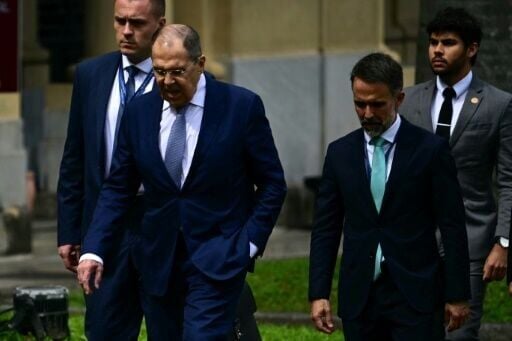Brazil, which chairs the 11-nation BRICS grouping that also includes Russia and China, called for closer cooperation Monday as the world deals with conflicts in Ukraine and Gaza and trade wars under US President Donald Trump.Â
Foreign ministers of the bloc met in Rio de Janeiro as Russian President Vladimir Putin ordered a three-day truce with Ukraine, whose President Volodymyr Zelensky described the move as "a new attempt at manipulation."
"We advocate diplomacy instead of confrontation, and cooperation instead of unilateralism," Brazil's Foreign Minister Mauro Vieira told the BRICS envoys in Rio.
"The conflict in Ukraine continues to have a severe humanitarian impact, highlighting the urgent need for a diplomatic solution," he added.
Ministers from the bloc -- which also includes Egypt, Ethiopia, India, Indonesia, Iran, Saudi Arabia, South Africa and the United Arab Emirates -- met to hone their agenda ahead of a leaders' summit on July 6 and 7.
The group has traditionally been cautious in its comments about the Ukraine war, issuing calls for peace while steering clear of condemning Russia's invasion.
Russia is a founding BRICS member and its foreign minister, Sergei Lavrov, attended the Rio gathering.
The meeting came at the start of what the United States has called a "critical week" for talks on ending the Ukraine war.
Trump appeared to turn against Putin at the weekend after a meeting with Zelensky at Pope Francis's funeral, saying he felt the Russian leader was "just tapping me along."
At the same time, the US president has been piling pressure on Kyiv to give up hopes of reclaiming Russian-annexed Crimea.
- 'Complete withdrawal' from Gaza -
Vieira on Monday also called for a "complete withdrawal" of Israeli forces from Gaza.
"The resumption of Israeli bombings and the continuous obstruction of humanitarian aid are unacceptable," he said.
The ministers are expected to issue a final joint statement Tuesday in which they will call for respect for multilateralism and international market rules.
Their meeting came at a critical moment for the world economy after the International Monetary Fund slashed growth forecasts over the impact of Trump's sweeping tariffs.
Since returning to the White House in January, the US leader has hit dozens of countries with a blanket 10 percent tariff, but China faces levies of up to 145 percent on many products.
Beijing has responded with duties of 125 percent on US goods.
Senior Chinese economic planner Zhao Chenxin said in Beijing Monday his country was on the "right side of history" in the face of what he called Washington's "unilateralism and bullying."
- BRICS currency 'premature' -
BRICS has expanded significantly since its 2009 inception as a group of four powers -- Brazil, Russia, India and China -- seeking an alternative platform to Western-led international organizations such as the G7.
It now makes up nearly half of the world's population, 39 percent of global GDP and weighs in on issues from Ukraine to Gaza to global trade.
A BRICS challenge to the hegemony of the dollar was expected to feature high on the agenda being prepared for July.
At a summit last year, BRICS members discussed boosting non-dollar transactions, eliciting a swift rebuke from Trump who threatened them with 100 percent tariffs if they undercut the US currency.
Speaking to Brazil's O Globo newspaper ahead of Monday's meeting, Russia's Lavrov said BRICS nations planned to "increase the share of national currencies in transactions" between member states, but said talk of transitioning towards a unified BRICS currency was "premature."
Vieira, whose country has so far been spared the worst of Trump's trade ire, also denied any plans to create a new currency.
Climate change is also expected to feature prominently in the ministers' final statement.
Brazil is the host of this year's UN COP30 climate conference, which will take place in November in the Amazon city of Belem.
ll-tmo-jbr/cb/mlm/mlr/bjt

